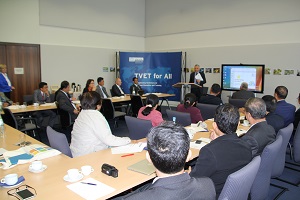
The UNESCO-UNEVOC International Centre: Who We Are | What We Do | Working With Us | Get in Touch
The UNEVOC Network: Learn About the Network | UNEVOC Network Directory
For Members: UNEVOC Centre Dashboard
Thematic Areas: Inclusion and Youth | Digital Transformation | Private Sector Engagement | SDGs and Greening TVET
Our Key Programmes & Projects: BILT: Bridging Innovation and Learning in TVET | Building TVET resilience | TVET Leadership Programme | WYSD: World Youth Skills Day
Past Activities: COVID-19 response | i-hubs project | TVET Global Forums | Virtual Conferences | YEM Knowledge Portal
Our Services & Resources: Publications | TVET Forum | TVET Country Profiles | TVETipedia Glossary | Innovative and Promising Practices | Toolkits for TVET Providers | Entrepreneurial Learning Guide
Events: Major TVET Events | UNEVOC Network News
 On 24 June 2015, the UNESCO-UNEVOC International Centre hosted the visit of the members of the National Skills Standards Authority (NSSA) of Myanmar. The study visit was part of the implementation of an EU-based learning programme organized by the Deutsche Gesellschaft für Internationale Zusammenarbeit (GIZ) and the Swiss Development Cooperation (SDC) in the areas of skills standards development, training, skills assessment and certification processes on occupational standards, assessment, testing and qualification systems. The 25-strong delegation was led by HE Htin Aung who serves as both the Deputy Minister of Labour, Employment and Social Security (MOLES) and the Chair of the National Skills Standards Authority (NSSA). The NSSA is comprised of a multi-stakeholder group of different Ministries, social partners and education and training institutions in Myanmar and promotes systematic training and certification of skilled workers in Myanmar.
On 24 June 2015, the UNESCO-UNEVOC International Centre hosted the visit of the members of the National Skills Standards Authority (NSSA) of Myanmar. The study visit was part of the implementation of an EU-based learning programme organized by the Deutsche Gesellschaft für Internationale Zusammenarbeit (GIZ) and the Swiss Development Cooperation (SDC) in the areas of skills standards development, training, skills assessment and certification processes on occupational standards, assessment, testing and qualification systems. The 25-strong delegation was led by HE Htin Aung who serves as both the Deputy Minister of Labour, Employment and Social Security (MOLES) and the Chair of the National Skills Standards Authority (NSSA). The NSSA is comprised of a multi-stakeholder group of different Ministries, social partners and education and training institutions in Myanmar and promotes systematic training and certification of skilled workers in Myanmar.
Mr Shyamal Majumdar, Head of UNESCO-UNEVOC International Centre, spoke on the importance of taking advantage of a new space that is being created for TVET to supply the changing skills demands in light of expanding the academic and vocational training agenda. He also emphasized that part of transformation that can be applied to the TVET sector is ensuring that TVET providers are adhering to the standards of learning outcomes for technical and vocational skills training, a key aspect to achieving quality and inclusiveness of TVET in the post-2015 context.
The UNEVOC team gave an overview of the international cooperation programmes and online resources coordinated and developed by the International Centre to support the promotion of UNESCO’s TVET strategy to the Member States.
The Head of UNEVOC also had the opportunity to discuss issues such as qualifications frameworks, the education post-2015 agenda and TVET reforms in Myanmar with senior members of the delegation.